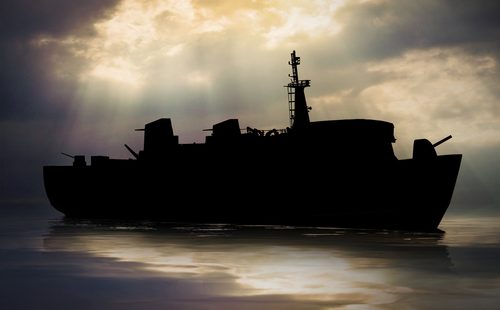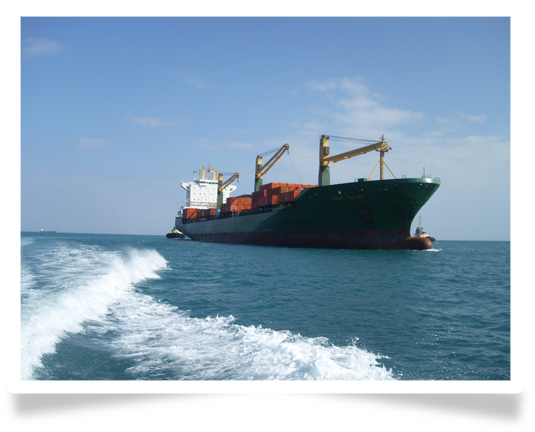
The word on the high seas is that the first modern-day Somali Pirates were, in fact, the Somali Coastguard. With Chinese, Spanish and Italian fishing fleets invading the waters off Somalia and fishing them almost dry of Tuna it was inevitable that the local population would take action. Initially, the Somali Coastguard would board these foreign fishing vessels and warn them to leave the area but because the seas were stocked with an abundance of Tuna, certain fleets chose to ignore this warning and continued to fish.
Before long, the Coastguard would board again and ‘impound’ the vessels; a release subject to a large fine which the shipping companies had to pay or risk losing the stores, vessels, and crew. With fishing grounds depleting and knowing just how easy it was to take a vessel and ransom it back to the shipping company, this was the flashpoint that sparked the phenomenon that we know of today. But what’s it really like to work in the Maritime Security (Marsec) sector? What do you have to do to get into it? Well, maybe this will shed some light on the subject:
A typical rotation for me starts when I make myself available to the Marsec company I work for. Flash to bang can be a matter of hours so when I tell them I’m available, I make sure my bag is packed and everything is ready to go. They’ll send me details of my travel arrangements, who I’m deploying with and normally the name of my first vessel and where I’m embarking. After that, it’s just like it was when I was in Afghanistan and Iraq; out of Heathrow and on my way.
Once I get to where I’m supposed to be, I’m either joining the vessel immediately, going to a hotel or one of my firm’s villas but before long, I know I’m going to be onboard and running through my routine. First things first, meet the Captain and introduce my team. I’ll have a chat with him about the vessel, crew, cargo, and route he’s intending on taking. While I’m doing this, the team members are conducting a security survey of the vessel finding out what they have, what they need and where we’re vulnerable. Recommendations are made to the Captain and we do what we can to make sure we’re as safe as we can be for the duration of the transit. We set up our kit including rifles, body armour, binos, NVG’s, camera and first aid kit in a corner of the bridge where we can see everything, we set a watch pattern and we hit the ground running. On my last rotation, from the UK to this point was 36 hours, which included 3 flights and not a lot of sleep.
Standing on the bridge wing of a 272m tanker doing 20 knots along the Internationally Recognised Transit Corridor (IRTC) in the Gulf of Aden sounds a lot nicer than avoiding roadside devices and suicide bombers in Afghanistan, which is often why people in the industry ask me how to transition from hostile PSD into Maritime Security; things have changed I tell them. No longer can you just get a mate to vouch for you and you’re in, nowadays you have to speculate to accumulate; that means paying out of your own pocket for courses.
There are so many Marsec companies out there now it’s hard to tell people what route to take. The rumour mill would have you believe that if you can get your hands on a UK Seamans Card and Discharge Book, you’ll get snapped up by any of the bigger firms; wrong. The truth is, the Marsec industry is starting to go the same way as the PSD sector with firms wanting potential or current employees to do their specific courses which, as we all know, aren’t recognised by the other firms so it’s a catch 22 situation. As a Team Leader with one of the biggest Marsec companies around, I’m lucky that I got into it when I did although they have even notified all employees that we must have an FPOS medical qualification by the end of the year; of course, they are able to provide that training at a reasonable cost. Thankfully, common sense has prevailed and they will recognise other formal medical qualifications so on the face of it, it’s not a money making scheme like other courses I’ve heard about.
My advice to people who ask is to be proactive, contact the Marsec companies direct and ask them what they require. Nowadays, most should say a potential employee needs a full STCW95 qualification (5 days of sea survival, fire fighting and first aid training), an ENG1 Medical Certificate (details on the MCA website), a recognised Ship Security Officer (SSO) qualification and a Yellow Fever Certificate. I would suggest all of that as an industry standard minimum, the rest will follow once you’ve got your foot in the door.
As an industry, Marsec has grown arms and legs in a very short period of time. Some people refer to it as the ‘new Iraq’ but it isn’t. Yes, the sector is growing daily but don’t expect the rockstar wages of 10 years ago. Most, if not all firms pay a daily rate. These can range from £200 to £350 a day depending on which company you work for and what tier you’re on (Team Leader or Team Member). There are normally different rates for a travel day on the first and last day of a rotation, to hotel/villa pay and finally sea pay and of course, you don’t get paid on leave.Rotations also differ from firm to firm with some having only short transits and others having enough work to keep people working for months at a time.
Less than two years ago, under 10% of all vessels travelling through the High-Risk Area (HRA) had security onboard, this has risen to 20% and it’s rumoured that as much as 70% of all vessel Captains have asked their companies for armed security whilst transiting this area. Of course, shipping companies are like all other companies, their aim is to make money so they are reluctant to spend on security. But, when instructed to comply with their respective insurance underwriters, it means more work is on the way. Due to a rather prolonged monsoon season in 2011, the Pirates were forced to release 8 vessels for much less than they would normally have done. This means their stockpile of hijacked vessels has depleted so they’re working hard on a re-supply at the moment, meaning more work for the Marsec companies.
Be warned though, Marsec is not as glamorous as it sounds and there is a downside. Yes, there is plenty of travel and we’ve all seen pictures on Facebook of blokes who we used to work with in Afghanistan or Iraq sitting on an exotic beach somewhere sipping a cocktail and smashing Op Bronze but that’s just a glimpse of a good day. You won’t find any pictures of anyone stuck on an old vessel with a crew who doesn’t speak English, eating fish heads, rice and chickens feet every day for a month, working six hours on six hours off. Add to that the constant boredom and knowing that if you are attacked you’re pretty much the first, last and only line of defence there is, with no QRF to come to help you either. Then you start thinking about what would happen to you and your team if the Pirates did capture you and that’s a frightening scenario. You may be the only westerners onboard so it’s not rocket science to figure out who you are and that you’re not part of the crew, therefore you’re a threat and will be dealt with as such.
Piracy is on the rise and the Pirates are getting better, their equipment and training is improving and they’re motivated by the massive ransoms that have been paid previously. But, with the support of the various government who are backing armed security onboard vessels (including the UK) and a potential downscaling of the Coalition support in the region, it is anticipated the private sector will go the same way as the land-based operation with Private Security Contractors outnumbering the Military.
If you’re thinking of getting into Marsec then ask around and make an informed decision. It has its good and bad points and it isn’t for everyone, but it’s here and it’s only getting bigger.
A day in the Life – Maritime Security
by: Jock Condon
This article originally featured in Issue 15, April 2012.


You talked about how when you are meeting the ship’s Captain, your crew is doing a safety inspection of the ship. Specifically, you mention that your crew is trying to find spots on the ship where you might be vulnerable. I would also have to think that being constantly away from family must be very hard to deal with– as well as the food!
Hello, I’m looking to become a maritime security officer. I’m really kinda stumped of how to go about it.. I understand it’s a different field to get into. Do you know of good schools located in the U.S.. What to look for and watchout for. any info is helpful.. thanks.